Families of Hamas-held hostages tell of growing concern for their fate
Lucy Manning
Special correspondent

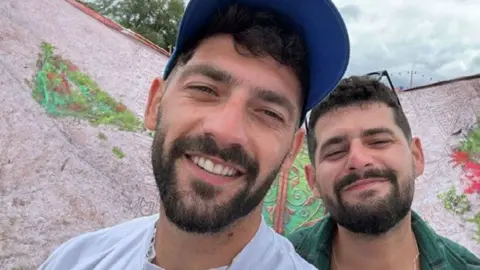 Hostages and Missing Families Forum
Hostages and Missing Families Forum
Families of Israeli hostages taken to Gaza in the 7 October attacks have expressed their increasing concern about the fates of loved ones, as doubts grow about how many are still alive.
One family said the hostages were at risk “every day” they continued to be held captive by Hamas.
Israeli Prime Minister Benjamin Netanyahu said this week there was “uncertainty” over the condition of three of the 24 hostages previously believed to be alive.
He was reacting to US President Donald Trump’s statement on Tuesday that only 21 of those taken in the Hamas-led attacks were still alive.
The BBC spoke to two families – including the brother of a hostage released by Hamas this year – after Israel’s security cabinet approved an expanded offensive in Gaza.
Netanyahu said ministers had decided on a “forceful operation” to destroy Hamas and rescue the hostages, and that Gaza’s 2.1 million population “will be moved, to protect it”.
One family told the BBC they hoped the troops would only be used to help with the aim of freeing the hostages, not for any other reasons.
Liran Berman’s twin brothers Gali and Ziv have been held by Hamas for 19 months after they were kidnapped from their home in Kibbutz Kfar Aza on 7 October 2023.
About 1,200 people were killed by Hamas-led gunmen that day, while Gali and Ziv were among 251 others who were taken hostage.
More than 52,780 people have been killed in Gaza during the ensuing war, according to the territory’s Hamas-run health ministry.
Israel cut off all deliveries of aid and other supplies on 2 March and resumed its offensive two weeks later after it broke a two-month ceasefire that saw 33 Israeli and five Thai hostages released in exchange for about 1,900 Palestinian prisoners in Israeli jails.
Following news of Israel’s plan to expand its military operation in Gaza using thousands more troops unless Hamas agreed a new ceasefire and released the remaining hostages, Liran Berman told BBC News: “I hope that Israel is sending the forces to put pressure on Hamas to sit down.
“When Hamas was feeling threatened, they did the deals. I hope they are not sending the troops to conquer or for revenge.”

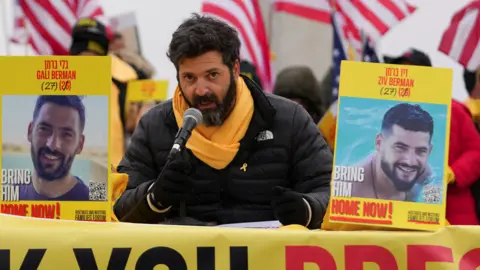 Reuters
Reuters
Mr Berman said his 27-year-old brothers were “at risk every single day”.
“We know they are alive. The released hostages saw them.”
He said he believed Gali and Ziv had been injured when they were seized but that he worried their mental condition was “not good” after so long in captivity.
With the release of emaciated and frail hostages in February, Mr Berman said he was worried about his brothers’ conditions.
“We need to pressure Hamas and its enablers.”

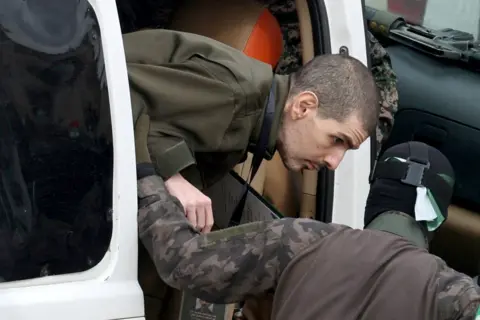 Reuters
Reuters
For 491 days, Or Levy was held by Hamas not knowing whether his wife Einav had survived the 7 October attack on the Nova music festival where he was taken.
She didn’t and for more than a year his three-year-old son Almog was without both his parents. In February, Or, weak and painfully thin, was released by Hamas.
His brother, Michael Levy, told BBC News he was worried about the impact on the hostages if Israel sent more troops into Gaza.
“I’m concerned it will affect the hostages, that the terrorists can decide to do something to them,” he said. “I do believe the army knows what it’s doing and they will make sure the hostages aren’t affected, but it’s always a concern.”
But he said he wanted more pressure applied to get them released.
“There is a crime against humanity and everyone including President Trump needs to do more in order to bring them back.”
He said his brother did not receive enough food while he was held hostage in Hamas’s underground tunnels in Gaza and “didn’t see sunlight”. He said he showered “every two months or so”.
“My brother worries about the fact the rest of the hostages will end up dying in captivity because that was his worst fear about himself and it’s now his worst fear about those he left behind.”
Of the 251 people taken hostage on 7 October – and the four other captives held by Hamas for around a decade before the attacks – 59 now remain in Gaza.
The Israeli government has publicly confirmed the deaths of 35, leaving 24 hostages. There is now uncertainty about the fate of three of them.
All 59 were kidnapped in the 7 October attack apart from one – the soldier Hadar Goldin who was killed in combat in Gaza during a previous war in 2014.
The living hostages are men in their 20s or 30s, apart from Omri Miran who turned 48 in April.
Of the 35 whose bodies Israel has confirmed are being held in Gaza, nearly all are men who were between 19 and 86 years old when they died. Three are women.
‘One pita bread per day’

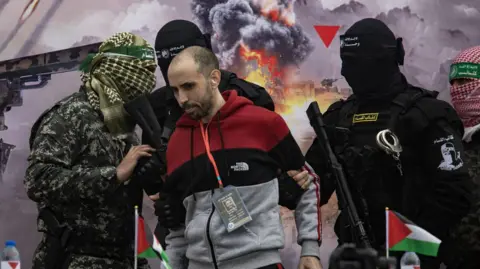 EPA-EFE/REX/Shutterstock
EPA-EFE/REX/Shutterstock
Since the spate of releases earlier this year, former hostages have been speaking to the media and others about their time in captivity.
Tal Shoham, 49, released in February after 505 days, told a UN event last month: “There were many times that we received just one pita bread for an entire day… Traumatised by hunger, we collected crumb after crumb.”

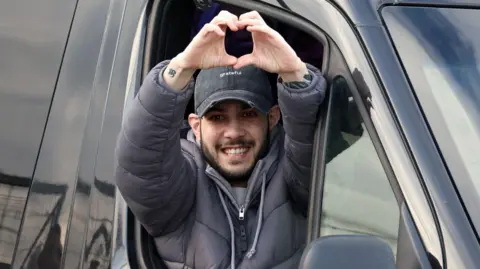 Reuters
Reuters
Eliya Cohen, 28, who was also held for 505 days, told Israel’s Channel 12 that once a week Hamas gunmen would make him and other hostages take off all their clothes and would tell them: “You you’re not quite there, you’re not thin enough… I’m thinking about cutting the food even more.”

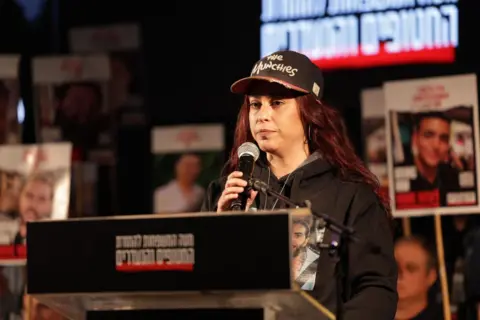 The Hostages and Missing Families Forum
The Hostages and Missing Families Forum
Ilana Gritzewsky was released during another ceasefire in November 2023. Her partner Matan Zangauker is still a hostage.
The 31-year-old told the New York Times in March that as she was kidnapped from her home she was molested by one of the kidnappers.
The article says she believes she was also sexually assaulted in Gaza. “When she came to, she said, she found herself on the floor in a dilapidated building, clearly in Gaza, her shirt up baring her breasts and pants pulled down, with seven gunmen standing over her.”
Ron Krivoi, a sound engineer, was kidnapped from the Nova music festival.
Last month, The Times of Israel quoted a Channel 12 interview in which he described the tunnels.
“We were inside a very, very small cage… and we had to lie down and rest in it – you couldn’t stand. No height, no toilets, no food. We were five people.”







